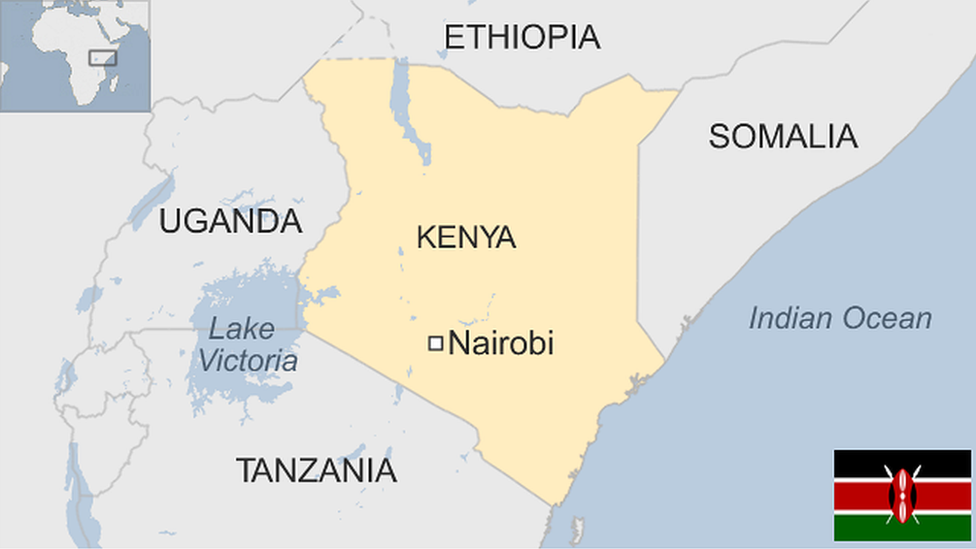Kenya's election: Your questions answered
- Published
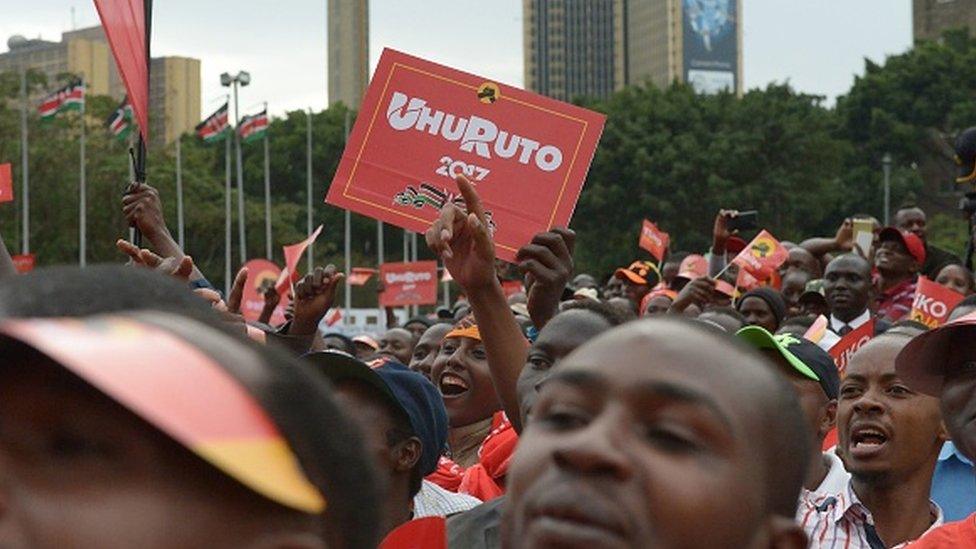
Ahead of Kenya's elections in 8 August, we asked you what questions you wanted us to report on.
We put some of them to our expert guests on BBC Africa's Kenya Election Watch podcast.
It's a 15-minute show with three segments: Main interview, fact-checking, and audience questions.
Listen to the final episode: Kenya Election Watch special: Everything you need to know about the elections.
Here are some of the questions we have already answered:
How important is ethnicity in the election?
Kenya's political leaders have always relied on the backing of members of their ethnic group and it will be no different this time around.
It is therefore not surprising that some political analysts have been looking at the voter registration in the candidates' ethnic strongholds as an indicator of who may have an upper hand.
Kenya's five major ethnic groups make up about 70% of the population. In order to win the presidential race a candidate needs to forge ethnic alliances to get a majority of that vote.
Ethnicity also plays a role in the MP, senate and local votes.
However, President Uhuru Kenyatta told the Financial Times that he expects this election to be fought on economic issue, externals, particularly the rising cost of food.
The opposition has accused the government for failing to anticipate food shortages resulting from the ongoing drought.
It has also accused the government of creating an artificial food shortage to allow affiliated businessmen to use the emergency period to import maize, a staple food, duty-free into the country.
The government has denied the allegations and has since moved to subsidise maize flour.
Mr Kenyatta could have a point about voters being motivated by issues other than ethnic affiliation.
A poll in April found that 28% of voters were undecided.
Which candidate will get Kenyan troops out of Somalia?
President Kenyatta has said that Kenyan troops will remain in Somalia as part of its peacekeeping mission until peace and stability are restored.
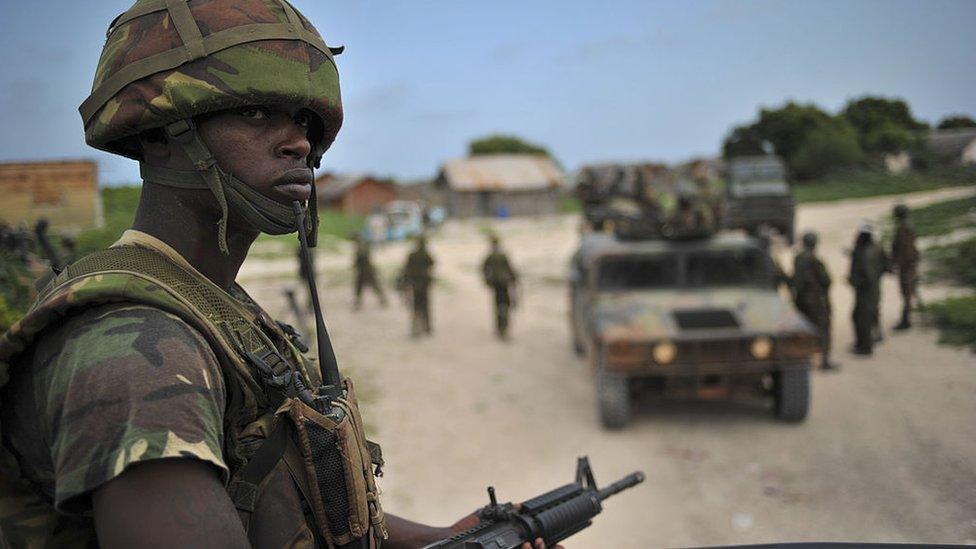
Kenyan troops are in Somalia as part of a regional force
Kenya has 3,600 troops serving under the UN mission in Somalia (Amisom), having been deployed in 2011 in pursuit of Islamist militants al-Shabab after a series of cross-border attacks.
But opposition coalition Nasa has said it would withdraw Kenyan troops from Somalia, saying they were needed back home.
Since the 2011 intervention, al-Shabab militants have perpetrated several attacks in Kenya, including the high-profile attacks in Westgate mall in the capital, Nairobi in 2013 and the killing of 148 students at Garissa University.
In January last year, some 150 troops were reportedly killed after al-Shabab militants overran a Kenyan military base. Others were captured and have appeared on the militants' propaganda videos.
The Kenyan government has not officially acknowledged the number of soldiers killed or kidnapped in the attack.
Will the electoral commission deliver a credible election?
A new team of election officials took office in January after the previous team was accused of mismanaging the 2013 election.
The judgement on the credibility of the election will have to be passed after 8 August.
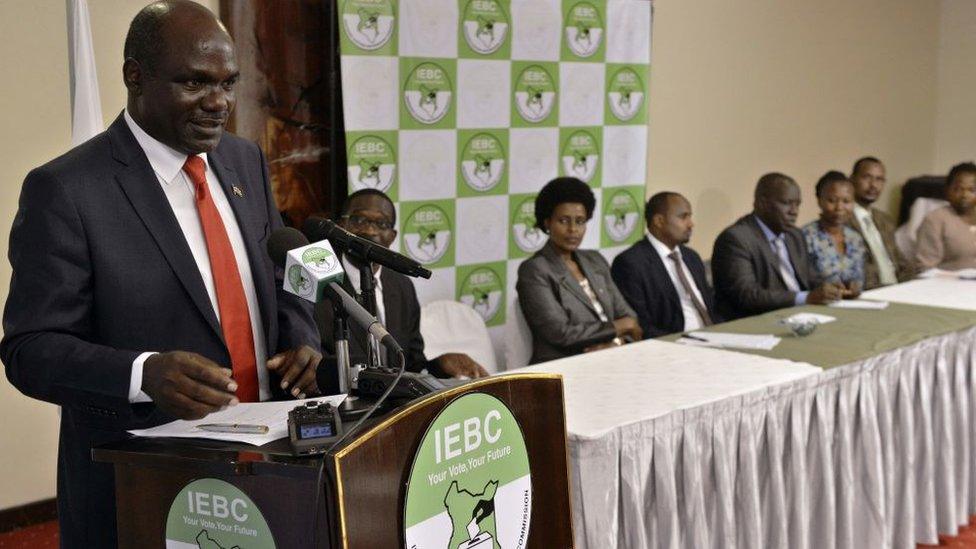
Mr Chebukati says his team has prepared well to overseee the election
The electoral commission says it is working on some of the challenges that characterised the 2013 elections, such as a lack of staff training on using the voting technology and delays in getting election materials.
The commission has acquired a system known at the Kenya Integrated Election Management System (KIEMS) which is currently being used to verify voters' registration and will be used on election day to verify the eligibility of voters, tally results and transmit them to a national tallying centre.
Electoral commission chairman Wafula Chebukati told a press briefing in May that the staff were interacting with the KIEMS machine months ahead of the election, unlike the previous election when staff were not given time to familiarise themselves with the new technology.
In February, 65% of those polled said they had confidence in the electoral body.
How are the campaigns using social media?
Social media is playing a bigger role in this election than in the past.
Kenya has a very active and loosely connected Twitter community who identity as #KOT (Kenyans on Twitter). Their influence can be seen during the campaign period where they push the agenda of their political favourites.
Political parties have also hired social media influencers who have big followings to push their messages.
Others have a dedicated team of "social media ninjas" whose role is to create a positive narrative and obfuscate any discussion that is deemed as damaging the campaign they are backing.
The parties and candidates are also creating short video explainers for their campaign talking points, memes and hashtags to push their agendas and attack their opponents.
Some politicians are also using Twitter bots to exaggerate the numbers of their followers.
The mainstream media is also using Facebook, You Tube and Twitter to broadcast political rallies and special programming.
The leading presidential candidates have been especially busy.
President Kenyatta has been sharing messages of unity and development:
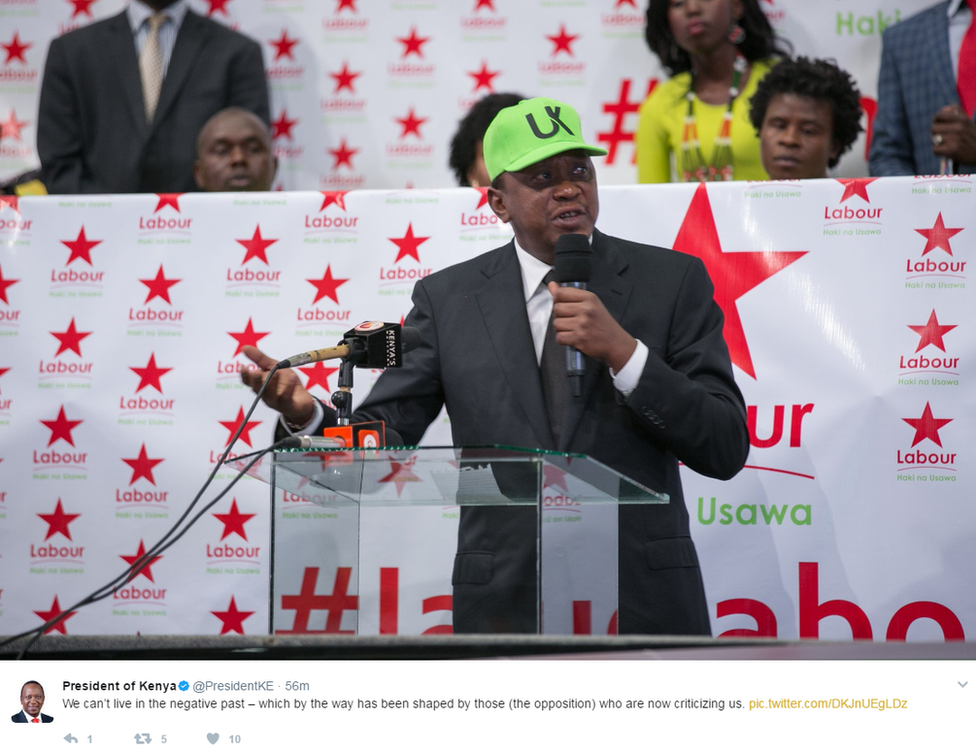
While opposition leader Raila Odinga has been saying that he has the backing of 10 million voters. Mr Odinga's campaign is essentially saying they are favourites to win the election because there are 19 million eligible voters.
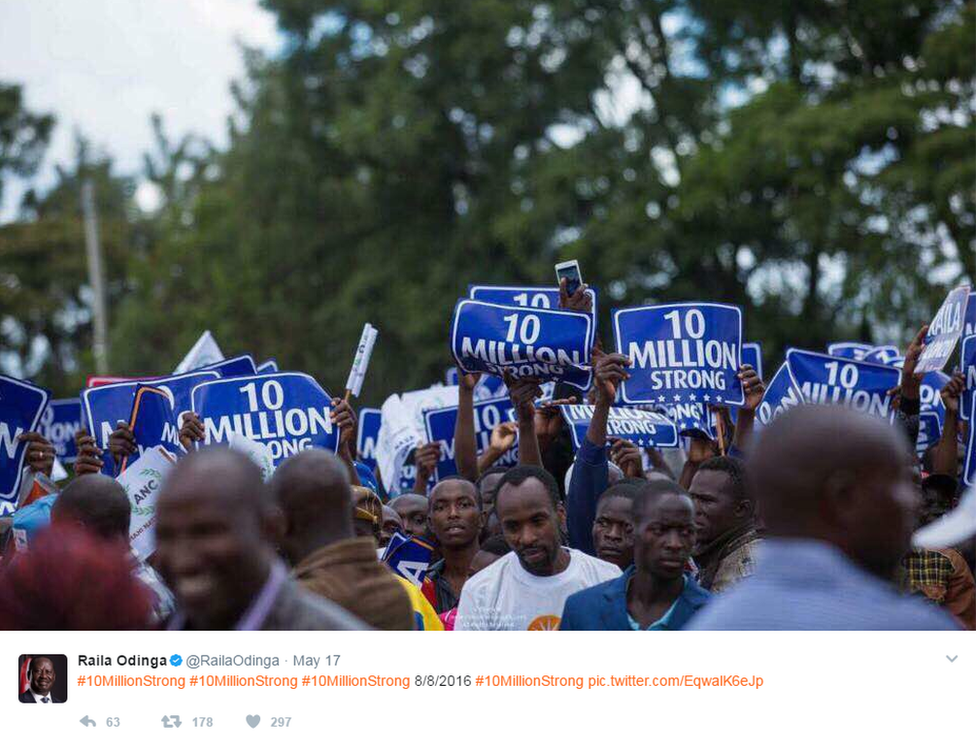
The minister for internal security has been critical of the opposition's rhetoric, saying it was creating anxiety in the country, but Mr Kenyatta's party has also been pushing the message that it will win the election by garnering 70% of the vote.
Thousands of candidates are competing for various seats but not all are getting much coverage on mainstream media, a situation that has led some of them, especially independent candidates, to use social media platforms like Facebook Live to engage with voters directly.
How are the politicians funding their election campaigns?
Kenya does not have an election campaign funding law. An attempt by the electoral commission to introduce one last year was defeated by MPs.
The commission had proposed caps for different seats:
President: $50m
Governors: $4m
Members of National Assembly ( MPs and Senators): $290,000
Members of County Assembly: $97,000
The absence of the law means candidates are currently free to spend as much as they want.
According to the privately owned Daily Nation, "most of the money is spent on logistics and advertisements but many candidates and parties also bribe voters".
It reports that in the 2013 election, then opposition coalition Cord spent in excess of $50m (£40m) while the governing Jubilee Party spent more than $100m to run its presidential campaign.
Politicians raise money from businessmen and some hold fundraisers. Opposition parties however accuse the ruling party of using state resources in its campaigns.
Will there be post-election violence?
Ken Opalo, from Georgetown University in the US, says that while there is likely to be some trouble, it will not be on the scale seen 10 years ago, which left more than 1,000 people dead and about 600,000 displaced from their homes.
"I am not too worried about the national elections. The real action will likely be at the county level," he said.
"There will most certainly be violence. But again, that will be more a reflection of what is at stake, rather than some descent into complete chaos and state failure."
This is a view shared by Nic Cheeseman, professor of democracy at the UK's University of Birmingham and a commentator on Kenyan politics.
He says "disorderly party primaries are a reason to be concerned, but that they may not lead to greater conflict come election day".
What is the true picture of Kenya's economy?
Kenya has maintained steady economic growth rate in the past five years, averaging 5% per year.
However, rising prices of basic goods like milk, bread and maize flour have pushed inflation up to 12%, and many Kenyan families say they are now struggling to get by.
Kenyans have been using the hashtag #CostOfLivingKe, external to share the costs of basic items and how they are adjusting their lifestyles.
"Every election year, the economy also experiences a shrinkage and that's no different this year as investors wait out on the election period," Kwame Owino, CEO of the Institute of Economic Affairs told the BBC.
"Some companies are currently cutting down employment, but not in big numbers, and the informal sector remains the biggest employer," he added.
Positives:
Kenya got $1bn in new investments in 2014 following some reforms like reducing the costs of doing business and bureaucracy, investment in infrastructure and lowering visa costs which has encouraged tourism.
Negatives:
The economy has however been strained by corruption, heightened political tension and state-controlled bank interest rates - a measure meant to reduce borrowing costs that has failed to deliver.
The UN's development agency (UNDP) says Kenya has the highest unemployment rate in the region, with four out of 10 Kenyans out of work.
Mr Owino says that dispassionate voters may be guided by who they think will best serve their economic interests.
How bad is corruption?
In its 2016 report Transparency International ranked Kenya at position 145 out of 176 countries.
It blamed Kenya's low ranking on the incompetence and ineffectiveness of anti-corruption agencies, saying that the failure to punish individuals implicated in graft had been a major stumbling block.
Anti-corruption campaigner John Githongo has called President Uhuru Kenyatta's administration "the most corrupt in Kenya's history".
Mr Kenyatta has, however, said his anti-corruption efforts were being undermined by the courts, who were slowing prosecutions and the anti-corruption agency, who he said were "sluggish".
Mr Githongo cites several reported scandals involving alleged inflation of costs of projects and payments to phantom companies.
In 2015, Mr Kenyatta suspended and eventually removed five ministers and other high-ranking officials on corruption allegations. Another minister resigned after public pressure.
Opposition members have also been named in several scandals but some have accused the government of scapegoating.
Constitutional bodies set up to fight corruption have been accused of being partisan and lacking independence.
Kenyan political analyst Barrack Muluka blames ordinary Kenyans for the corruption problem, saying that they are blinded by their ethnicity: "A government can steal as much as it wants and Kenyans will be happy as long as it's 'our thieves'."
He points at the April party primaries where candidates of questionable integrity and those accused of being involved in corruption won their races.
Mr Githongo, calls it "normalisation of the absurdity".
He says that theft has become normal: "Those we used to call thieves are now hustlers," he says.
- Published27 April 2017
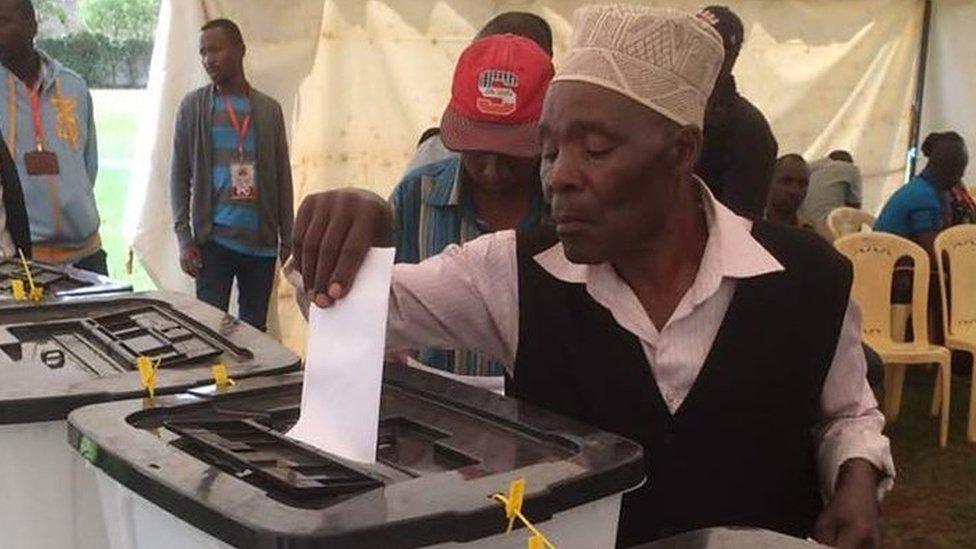
- Published22 April 2017
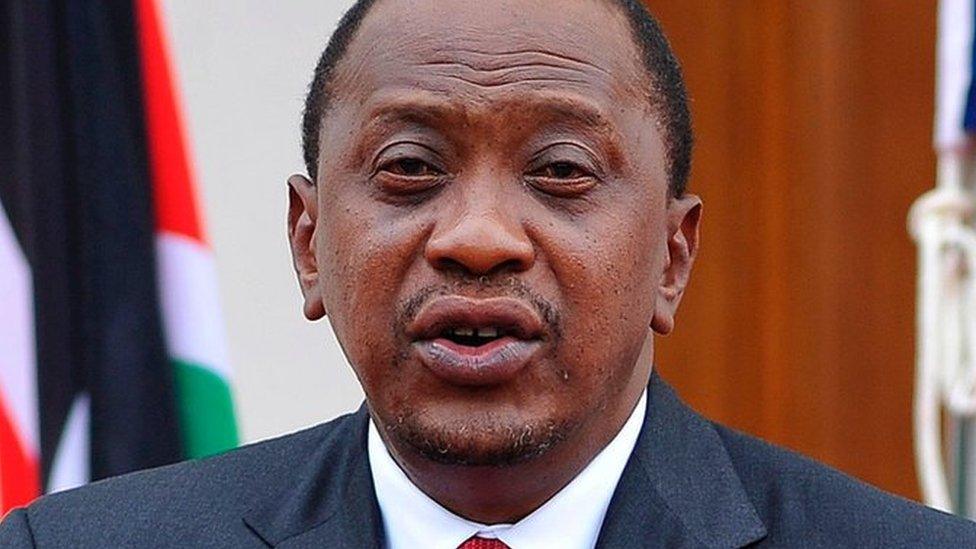
- Published2 April 2017
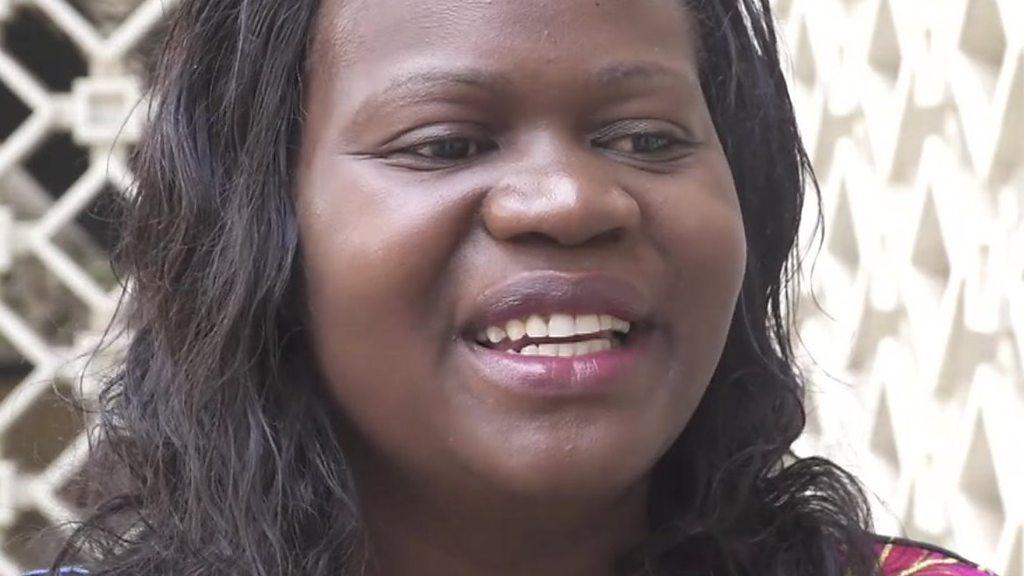
- Published9 January 2017

- Published4 July 2023
